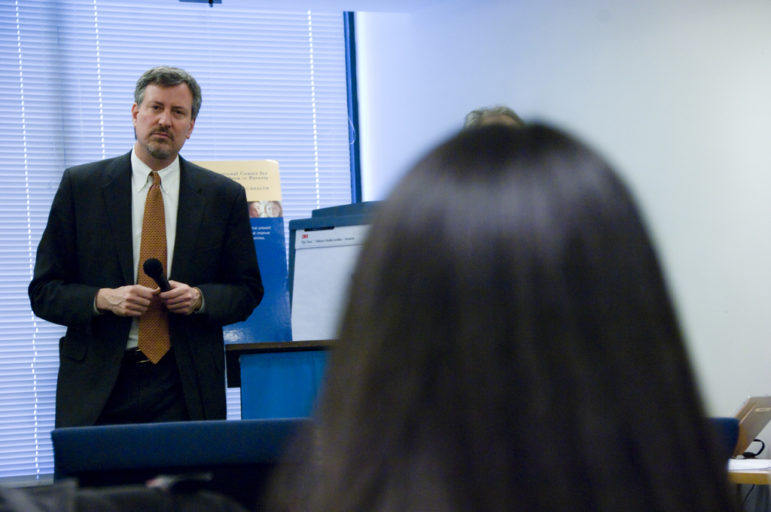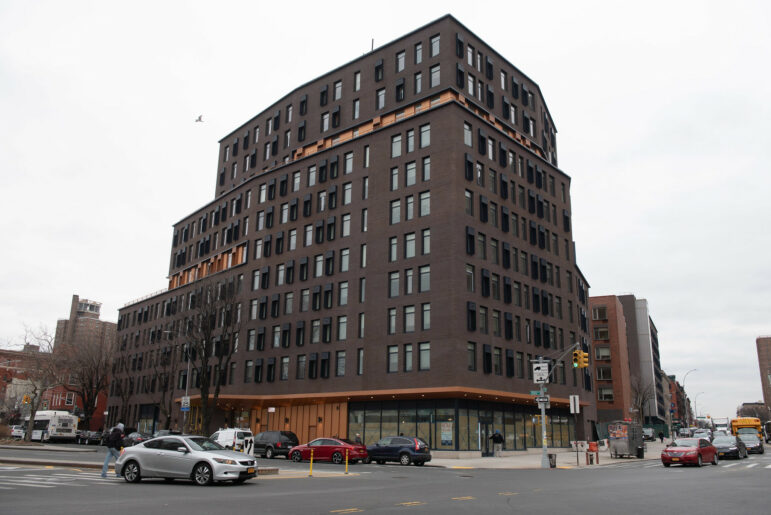
William Alatriste
Bill de Blasio as a Councilman in 2009.
The critics claimed that the mayor’s preliminary budget included millions in cuts that would hurt poor people. One Councilmember said: “They’re robbing Peter to pay Paul.” City Hall, according to the Daily News, dismissed their foes’ comments as “‘tremendously misleading'” because “ultimately the Council would decide how the programs are funded.”
That episode might sound eerily similar to the brouhaha over the past few days concerning media reporting—including by City Limits—about how Mayor de Blasio’s preliminary budget deals with the Emergency Food Assistance Program, which funds food pantries.
But the dust-up described above occurred in 2004. The mayor was Mike Bloomberg. And the Councilman quoted was Bill de Blasio.
Not that it was unusual for de Blasio, or any other member of the Council, to take Bloomberg to task for what was in his preliminary budget. That’s exactly what the preliminary budget is for.
After all, the City Charter says that every year the mayor must “prepare and submit to the council a preliminary budget and an executive budget each of which shall present a complete financial plan for the city and its agencies for the ensuing fiscal year, setting forth proposed operating and capital expenditures, proposed interfund transfers, anticipated revenues and any other anticipated sources and uses of funds.” In particular, “each such budget shall consist of three parts,” one of which is “the expense budget, which shall set forth proposed appropriations for the operating expenses of the city including debt service.”
In the Independent Budget Offices’ guide to the budget process, the preliminary budget—which ran to just under 5,000 pages this year (in parts 1, 2 and 3) that the mayor unveiled at a 103-minute press briefing—is described as a document containing “proposed operating and capital expenditures, and forecast of revenues for the upcoming fiscal year” that’s followed in May by the executive budget, which is “a revised budget proposal for the upcoming year.” The City Council’s budget explainer similarly depicts the preliminary budget as “an outline of his priorities and goals for the city.”
“The Council then follows a process to ensure this budget meets the needs of our diverse neighborhoods,” the Council’s website explaines. “From March to April, the Council analyzes the Mayor’s preliminary budget and holds a series of public hearings to identify specific concerns through conversations with residents, advocates, and city agencies.” After that round of hearings, the Council literature says, “Based on our analysis, the Council formally responds to the Mayor’s preliminary budget. This includes a summary of concerns expressed during the hearings and recommendations to address those concerns.”
(A lesser man would use ‘food fight’ as the subhead here. But not I.)
In de Blasio’s FY2018 preliminary budget, he puts forward a budget of $8,241,597 for supplies for the Emergency Food Assistance Program and another $3,219,651 for contracts under that initiative. The total is $11,461,248. That is $5.7 million less than the city is scheduled to spend in this current fiscal year. (See chart below)
After anti-hunger advocates highlighted this fact, City Limits and other news outlets reported on it. The mayor was asked about those reports on WNYC’s The Brian Lehrer Show last Friday. He described the reports as “inaccurate,” arguing that a budget cut didn’t really exist until the city’s final budget was adopted. He urged listeners to not rely on “journalistic outlets” to understand the budget.
The mayor’s comments were analyzed by three members of the City Hall press corps on the Lehrer show on Monday and the mayor was asked about them at a press conference later in the day. “I was referring to a specific article that I think failed clearly to look at the adopted budget of the last three years, which I thought was an omission that went beyond ignorance,” he said. “It’s really disingenuous to suggest—I have a witness here in the budget director—to suggest that we haven’t fully funded emergency food programs.”
Asked if the mayor was suggesting that City Limits’ reporting about the budget had deliberately distorted the facts, a City Hall spokesman said the mayor “was right to point out the disingenuous nature of the reporting.”
“It wasn’t reflecting reality,” Phillips wrote in an email. “It focused on a bureaucratic sequence that purposefully led the reader to think an outcome was likely that any fair reading would have provided a more credible alternative to.”
This is not the first time that the mayor has clashed with the media over coverage that is critical of him. He has previously tried to restrict the types of questions he gets asked at press conferences and at one point refused to answer questions from the New York Post.
Dispensing with the preliminary
As a councilman, de Blasio was sometimes an aggressive critic of Bloomberg — especially when de Blasio was acting in his role as chairman of the general welfare committee, which oversees social programs. From that perch, de Blasio did not shy from targeting his predecessor’s preliminary budgets.
In 2003, de Blasio was a leading figure in the fight to keep open firehouses that the mayor’s draft budget slated for closure and took the position “that the city should restore planned cuts to preventive services” for children that had been in Bloomberg’s prelinary budget. “Just 10 years ago, child abuse had become an epidemic,” he said. “We’ve made progress in recent years in stopping child abuse but these budget cuts and layoffs threaten to turn back the clock.” In another foreshadowing of the current dispute, the Times reported, “An Administration for Children’s Services spokeswoman said it was ‘premature’ to discuss the cuts because the budget is still under negotiation.”
De Blasio moved preemptively in 2007, holding a January press conference to urge Bloomberg to maintain the same level of funding adopted by the Council for the 2007 fiscal year in his budget for fiscal 2008. The following year, de Blasio criticized a $3.2 million hit that Bloomberg’s preliminary budget delivered to food aid. “De Blasio questioned,” the Daily News reported, “why the city is cutting funding for the hungry when the national economy is deteriorating and ‘hunger is going to get worse.'” He also criticized proposed school budget cuts in the preliminary.
And cuts to children’s services in the preliminary budget drew de Blasio’s ire in 2009, according to the Times.
”No one knows better than you how much work it took to get this agency up to the capacity it needed after the Nixzmary Brown tragedy,” the Times quoted de Blasio as saying. ”How can you, in light of this sustained need, take 7 percent of your child protection staff out of your lineup and expect to do the same work?”
In the end, the ACS workforce shrank considerably that year.
As the chart below indicates, the city’s adopted budget–which is the product of negotiation between the mayor and the Council–has increased funding for EFAP in all three years of the de Blasio administration. The mayor’s preliminary and executive budget requests have reverted to the baseline that existed when de Blasio took office.








